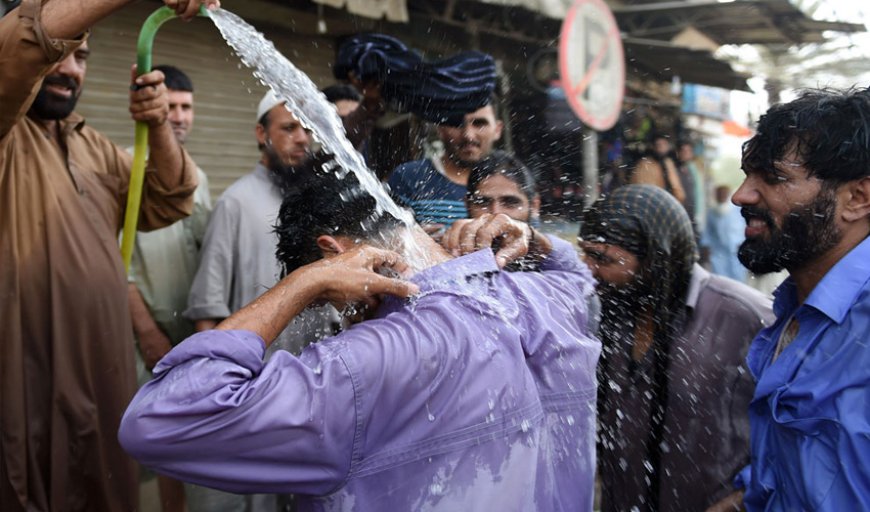Heatwave in Karachi
encored.xyz, encored, breaking news, encored.xyz.com

Heatwave in Karachi
Overview
Karachi is currently experiencing an extreme heatwave that has resulted in the deaths of over 500 citizens. This crisis has led the session court to issue a notice in response, drawing attention to the severe impact of the heatwave on the city's population and the urgent need for measures to address the situation.
Impact of the Heatwave
The heatwave in Karachi has had devastating effects on the city's population:
- Casualties: Over 500 people have died due to the extreme heat, with many more suffering from heat-related illnesses.
- Health Impact: Hospitals are overwhelmed with patients experiencing heatstroke, dehydration, and other heat-related conditions.
- Vulnerable Populations: Elderly people, children, and those with pre-existing health conditions are particularly vulnerable to the extreme temperatures.
Meteorological Conditions
The meteorological conditions contributing to the heatwave include:
- High Temperatures: Temperatures have soared above normal levels, reaching dangerous highs that pose significant health risks.
- Humidity: High humidity levels exacerbate the effects of the heat, making it more difficult for the body to cool down.
- Lack of Rainfall: The absence of rainfall and cooling winds has prolonged the heatwave, adding to the severity of the situation.
Government Response
The government has taken several steps in response to the heatwave crisis:
- Emergency Measures: Declaration of a state of emergency in affected areas to mobilize resources and provide immediate relief.
- Cooling Centers: Establishment of cooling centers where residents can seek respite from the heat.
- Public Awareness: Launching public awareness campaigns to educate citizens on how to protect themselves from heat-related illnesses.
Session Court Notice
The session court has issued a notice in response to the heatwave, highlighting the following points:
- Accountability: Calling for accountability from government and local authorities regarding their preparedness and response to the heatwave.
- Relief Efforts: Emphasizing the need for enhanced relief efforts to support affected citizens.
- Long-Term Planning: Urging the development of long-term strategies to mitigate the impact of future heatwaves and improve infrastructure resilience.
Public Health Initiatives
Public health initiatives have been launched to address the immediate and long-term health impacts of the heatwave:
- Medical Support: Deployment of additional medical staff and resources to hospitals and clinics.
- Hydration Stations: Setting up hydration stations across the city to provide free drinking water to residents.
- Community Outreach: Mobilizing community health workers to educate residents on recognizing and preventing heat-related illnesses.
Challenges Faced
Several challenges are hindering effective response to the heatwave:
- Infrastructure Strain: The city's infrastructure is struggling to cope with the increased demand for electricity and water.
- Resource Limitations: Limited resources and funding are affecting the ability to provide adequate relief and medical support.
- Coordination: Ensuring effective coordination between different government agencies and non-governmental organizations is crucial for an efficient response.
Recommendations
Experts have made several recommendations to better handle the current heatwave and prepare for future events:
- Improved Forecasting: Enhancing weather forecasting capabilities to provide earlier warnings and better prepare for heatwaves.
- Urban Planning: Implementing urban planning measures to create more green spaces and reduce the urban heat island effect.
- Infrastructure Upgrades: Investing in infrastructure upgrades to ensure reliable access to water and electricity during extreme weather events.
- Public Health Preparedness: Strengthening public health systems to better respond to heat-related emergencies.
Future Prospects
Addressing the heatwave crisis requires both immediate action and long-term planning:
- Short-Term Relief: Continued focus on providing immediate relief and medical support to affected residents.
- Long-Term Strategies: Development of comprehensive long-term strategies to improve the city's resilience to extreme heat and other climate-related challenges.
- Community Involvement: Encouraging community involvement and collaboration to enhance preparedness and response efforts.
Conclusion
The extreme heatwave in Karachi has highlighted the urgent need for effective response measures to protect the city's population. With over 500 deaths and widespread health impacts, it is crucial for government authorities, public health agencies, and the community to work together to provide immediate relief and develop long-term strategies to mitigate the effects of future heatwaves. The session court's notice underscores the importance of accountability and proactive planning in addressing this pressing issue.

 Admin
Admin 





